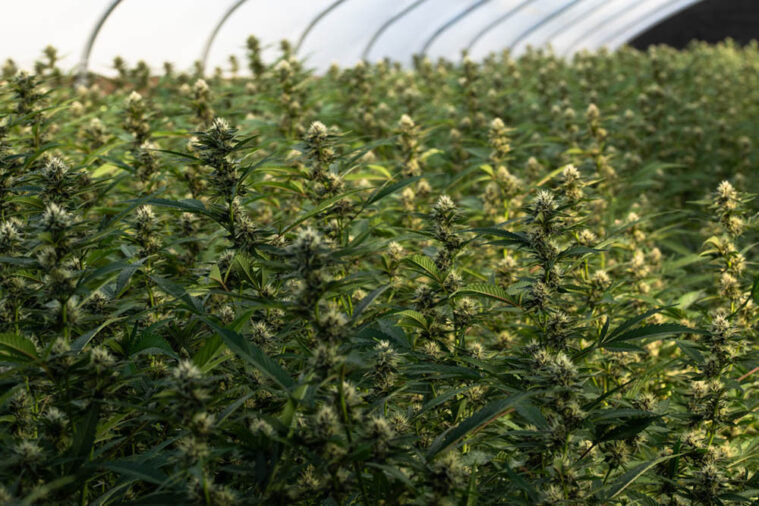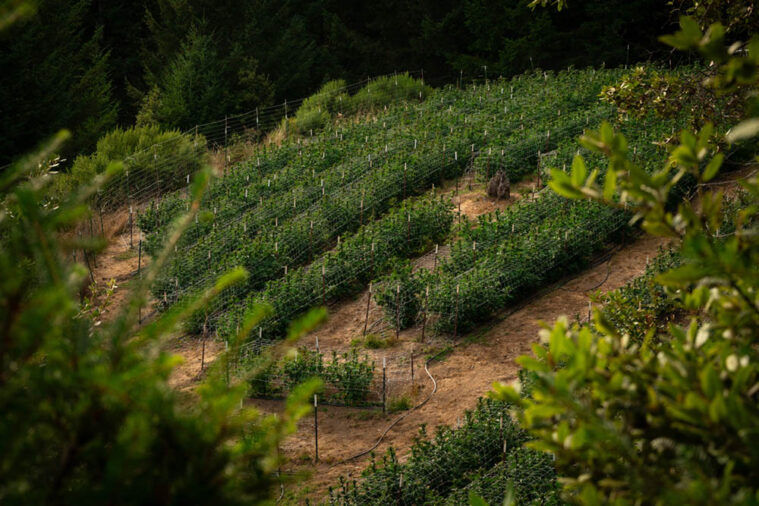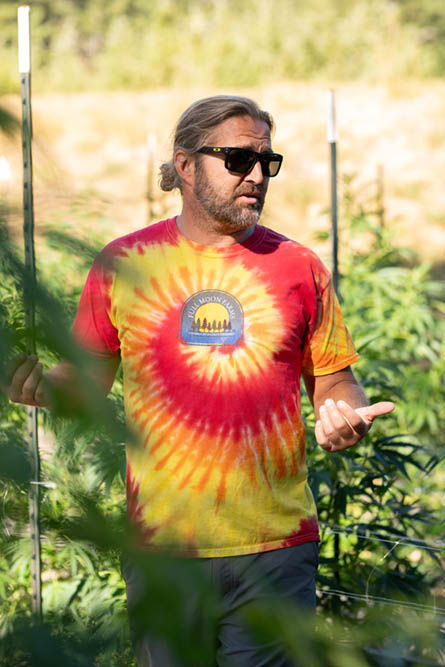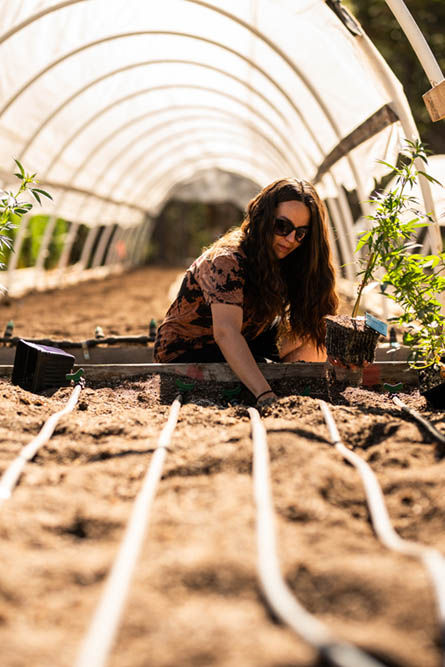At the top of a sunburned ridge in southern Humboldt, somewhere around Mad River, the light hits differently. Mornings start slow and golden, with fog curling around the redwoods. By noon, the heat turns sharp and dry, and there’s the smell of resin floating on dust. That’s when Nik Erickson walks his rows at Full Moon Farms, boots kicking up powder, fingertips brushing buds heavy with the end of the season.
“This is what it’s all for,” he said. “Everything leads here.”

It’s harvest in the Emerald Triangle, and this year, Erickson almost didn’t make it. In the spring, an ATV accident tore through his leg and sent him to the ground.
“It was bad,” he said. “Everything stopped.”
A farmer’s nightmare — the season just starting, soil still cool, plants barely rooted — and he couldn’t move. He watched from a bed while his wife, Darien Griffith, his crew and neighbors carried on without him.
“They did everything,” Erickson said. “Watered, hauled soil, kept it alive. They saved the farm.”
By midsummer, he was back on his feet, slower but present. The limp is there, but so is the work. He calls the accident a reset.
“You think you’re invincible until you’re not,” he said. “Then you realize how much of this is borrowed time — your body, the weather, the market. You start paying attention.”

Erickson has paid attention to this land for decades. Full Moon sits high enough to catch both fog and sun, a perfect cross of moisture and heat that pulls terpene from soil the way vines pull flavor into grapes. The ground is light and sandy, fast-draining and alive with mycelium. Hawks circle above the property. Rattlesnakes sun themselves near the irrigation lines.
“Everything out here wants to live,” Erickson said. “You just try to work with it.”
That instinct — coexistence instead of control — is what keeps him here. He started growing in the early ’90s, back when every supply run felt like a risk and irrigation meant carrying water in 5-gallon jugs up steep hillsides.
“You never stopped looking over your shoulder,” he said. “But the plants didn’t care about fear. They just wanted sun and good dirt.”
The rhythm of those outlaw years still runs through his work: quiet mornings, long days, no shortcuts.
These days, he’s part of Humboldt Family Farms, a collective built to keep independent growers like him afloat in a market better oriented toward larger farms and bulk sales. Scott Vasterling, HFF’s founder, calls Erickson “a cornerstone.”

“Nik represents the true Humboldt farmer: family-run, sun-grown, craft-first,” Vasterling said. “Our job is to give farmers like him a way to survive without selling out what makes them special.”
Through the partnership, Full Moon’s flower reaches shelves across California under the HFF label — small-batch, soil-grown Cannabis that still carries the fog and grit of its origin. It’s more than distribution; it’s survival with dignity.
“You get to stay on your land and keep your name,” Erickson said. “That’s the whole point.”
The farm itself is modest and efficient. Hoop houses are stitched together from salvaged lumber. There’s a water tank big enough to feed the ridge through dry spells. Grapevines fill the dead space between rows. A kid — his son — runs barefoot with a magnifying glass, hunting for caterpillars.
“He’s learning fast,” Erickson said, watching him go. “Knows what powdery mildew looks like already. That’s Humboldt education.”

Photographer Ryan Johnson Bitar, who shot the farm this season, said nothing about Full Moon is posed.
“Nik doesn’t slow down for the camera,” he said. “He’s trimming, talking to his wife, checking pressure gauges. It’s all movement. You can see how much of it is instinct.”
Instinct and muscle, the kind that remembers where each strain belongs on the slope — the way OG likes it hot and dry, how mold creeps first on the lower beds, how the wind shifts before a storm.
“You learn to read what the plants are saying,” Bitar said. “They tell you when they’re ready, when they’re tired, when they’re just showing off.”
Erickson is still recovering, but you wouldn’t know it from the pace. The accident left scars and a deeper patience. He works slower now, steadier.
“You realize how thin the line is between everything working and everything falling apart,” he said. “That’s farming. You learn to appreciate the middle ground.”


That middle ground between legacy and legality, survival and success is where Humboldt lives now. The price per pound has collapsed, regulations choke the small guys and corporations push volume instead of craft. Yet farms like Full Moon and the HFF collective still pull harvest from the same hills that built the world’s Cannabis reputation. They do it with the same hands that used to run from helicopters.
“There aren’t many of us left,” Erickson said. “But the ones who stayed, we stayed because we love this. Because it’s ours.”
By late afternoon, the light bends low across the ridge, hitting the resin just right. The plants shimmer like they’re lit from within. Erickson moves down the line, clipping a branch, checking the cure, talking low to his crew. His wife stacks trays in the drying shed. The boy chases the dog toward the fence. Everything hums: the generators, the crickets, the quiet pride of another harvest pulled from the Earth.
“This place has given me everything,” he said. “It’s taught me how to work, how to listen, how to start over.”
He wipes his hands on his jeans and looks across the valley, where the last light catches the tops of the trees.
“It’s all about staying grounded,” he said. “Literally.”









